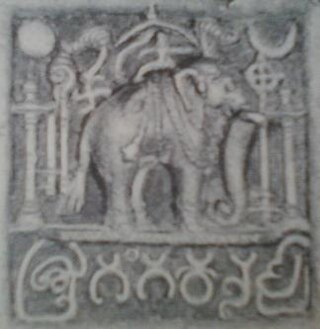Top Qs
Timeline
Chat
Perspective
Shivamara II
Western Ganga King from 788 to 816 CE From Wikipedia, the free encyclopedia
Remove ads
Shivamara II or Saigotta Shivamara was the son of Sripurusha and ruled the Western Ganga Dynasty from 788 – 816 C.E. He was also a noted an important patron of Jainism. He was also known as a scholar, writing works such as "Gajashtaka" (in Kannada), "Gajamathakalpana" (in Sanskrit), and Sethubandha (in Prakrit), though these texts are now lost.[1][2] According to historian Kamath, he is considered to be one of the famous kings of the Western Ganga Dynasty.
He succeeded to the Ganga throne during a time when the Rashtrakuta were the empire on the rise in South India and the Deccan.
Remove ads
Reign
Shivamāra II ascended the throne after his father Sripurusha and faced repeated conflict with the rising Rashtrakuta power. Captured multiple times by King Dhruva Dharavarsha and later Govinda III, he was imprisoned for refusing tribute. Still, he repeatedly rebelled and regained his throne, dying fighting for independence around 816 CE.[3][4]
Conflict with Rashtrakuta
The Rashtrakuta monarch Dhruva Dharavarsha defeated Shivamara in Mudagunduru and took the Ganga king captive. The Rashtrakuta then took direct control of the Gangavadi with the appointment of Kambharasa, son of Dhruva Dharavarsha as its governor. He was later released, only to be imprisoned again during the rule of Govinda III when he refused to pay the Rashtrakuta tribute. Shivamara II again was released only to defy the Rashtrakuta yoke by waging wars. He died fighting them in 816. Manne near Bangalore was one of his capitals during this time.
Remove ads
Religion and Patronage
A staunch Follower of Jainism, Shivamāra II undertook extensive temple-building and granted land to Jain monasteries at Shravanabelagola, Kummadavāda, Hebbalaguppe, and Mulivalli. He continued the Ganga dynasty's legacy of religious patronage and is credited with commissioning the Chandraprabha Basadi and other early basadis.[5]
Jain Monk Kumudendu Muni, in his own writing "Siribhoovalaya", described that he has been the guru of Shivamara II along with Rashtrkuta king Amoghavarsha[6][7]
Legacy
Shivamāra II is considered one of the golden champions of Jain royalty in Karnataka. His reign anchored Jain architecture and scholarly traditions, setting the stage for his successor Rachamalla I and later rulers like Marasimha II and the minister Chavundaraya.[8][9]
References
Bibliography
External links
Wikiwand - on
Seamless Wikipedia browsing. On steroids.
Remove ads
